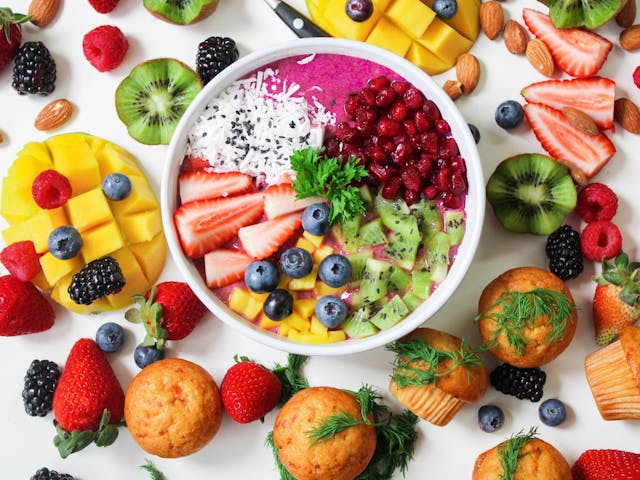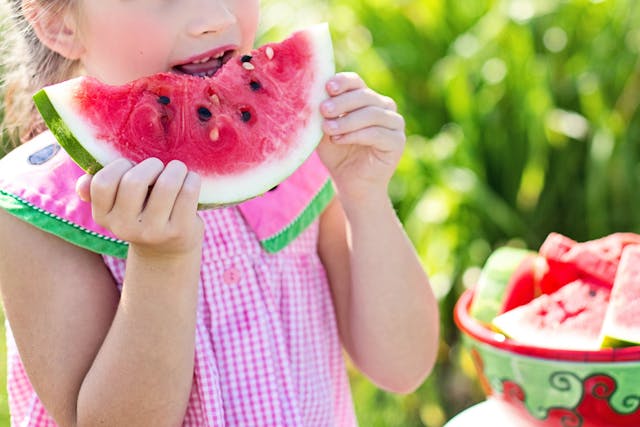Appropriate nutrients for kids are highly essential. There are huge choices of meal around the world but make sure your child receives the appropriate nutrients and keep this your priority as their mind, physical work and growth will be according to their sufficient healthy nutrition intake.
In growing age of Childrens, they need nutrition and it is necessary to give them balanced and healthy food. Now a days it is not difficult to provide them healthy foods if parents have busy schedule, because there are many easy tips parents can do instead of having busy time table. Moreover, there are so many easy recipes that are not very costly. With providing healthy nutrition it is also very important to make eating of healthy meals in children so that in later life they would know the importance of having healthy life style.
This article will help you in guiding importance of nutrition in children as well as this article will give you easy tips that how can you make habit in children to eat healthy.
In This Article
Importance of Nutritional Food for Infants and Young Children
Kids require the right nutrients at the right age in order for their growth and development of body as well as brain. The most essential period to give them good nutrients is from pregnancy to kid’s second birthday. It will estimate almost 1000 days. Breastfeeding is very important for first two years of life as it helps to provide immunity that protects child from illness, It stimulates mind development hence it is a life-saving factor for kid. It is a source of full nutrients that a kid requires.
According to UNICEF and the World Health Organization infants starts to breast feed milk during first hour of period they born, shall fully feed breast milk for initial six months and remain on breast feeding by two years of age and a little beyond that time.
When a child reaches six months he requires to start eating first food. Young kids should remain on breastfeeding at frequent basis and in sufficient quantities during day time. Along with this they should have their food full of nutrients and verities of food should be given to them. They should feed food with clean hands and in clean utensils and caregiver or parents should identify child’s hunger signal.
Children at younger age needs diets containing grains along with some fruits, vegetables, eggs, dairy compounds, fish and meat. Sugar containing drinks and packed food full of salts, sugar and fat is highly hazardous for child’s health. Unhealthy and insufficient nutritional meal in early childhood can make them vitamins and nutrients deficient babies. For example: Vitamin A deficiency cause weak immune system that results in high risk of blindness. Also, weak immune system results in causing dirrhoea that can even cause death in children.
Why nutrient rich food is important for children?

During growing and developing age of kids, the nutrients help them to give strength and provide good health to them. Following are the reasons to provide sufficient nutrients to children.
Growth and Development both Physically and Mentally: Sufficient concentrations of nutrients, vitamins, and minerals are required for physical growth, mind development as well as strong immune system.
Maintaining a healthy weight: Healthy weight is very important for children. Underweight child is not capable to show their proper performance in academia and also physical activities while overweight babies can at risk to develop certain diseases.
Proper Immunity: A healthy food helps to provide proper immunity to children. This can result in less risk of infections and other illnesses. Vitamins like C, D, Zinc and anti-oxidant compounds are very useful to increase immunity against illnesses.
Bone health: A healthy food for children is necessary for their physical structure and strong bones. Healthy food can prevent bone diseases in children such as Rickets and other disorders such as fractures.
Emotional Health: A healthy food in children not only improves physical health but also brain and emotional health. A healthy meal which is full of nutrients is beneficial for mood and behavior.
Proper Brain and Cognitive functions: Nutrient rich food can help children for proper cognitive functions such as learning, problem solving, memory, concentration, decision making and other intellectual skills. Minerals like omega-3 fatty acids, iron, zinc, and B vitamins are very essential for working of brain and cognitive function in children.
Dental Health: Nutrient rich food can provide good oral hygiene to children and make stronger teeth. It can help to improve dental health in children.
Energy and Physical Activity: Food gives energy to perform different work and activities in daily life. A highly nutrient meal helps to give energy to children to perform activities like sports, physical activities as well as academic performance. Physical activities also help in weight management in children.
Prevention of Vitamins and Minerals Deficiencies: Proper meal helps to overcome and prevent vitamins and minerals deficiencies. Vitamins and Minerals are important for physical, mental and emotional health. Also, to hydrate body. If there is deficient minerals and vitamins in body so health issues like anemia, fatigue, memory loss and irregular growth can occur.
Protection from long term diseases: Providing a Nutrient rich food to children can decrease the risk of long-term diseases in childhood as well as in adulthood. Examples of long-term diseases are obesity, Diabetes Mellitus type 2, heart issues, cancers and other health related problems.
Quality of life: Nutrient rich food helps in physical, emotional and mental well-being of children. This results in performance of daily tasks efficiently by providing good health. They can achieve much more in life by being healthy physically and mentally. Health food is definitely a reason to give good quality of life by providing physical, mental and emotional stability.
What is good Nutrition for Children?

Following nutrients are very important for growing children and should be included in their food:
Protein: Proteins are significant compounds that helps for growth of body. Many types of cells in body neurons, DNA are made of proteins. Children needs protein for their body growth as well as forming of cells and tissues. Proteins are very important for body in order to form cells, tissues, organs and structure. Most of the immune cells are made of proteins so it is also needed to improve immunity. It should be important part of child’s meal. Examples of protein containing ingredients include lean meats, poultry, fish, eggs, dairy products, and plant-based sources like beans and tofu. They all help to provide the necessary protein to form body tissues and strengthen muscles.
Calcium: Calcium is needed in order to form bony structure and for formation of strong bones and teeth. Dairy products are known to be rich in calcium. Examples include milk, yogurt, cheese, butter, milk cream are rich in calcium. There are also some non-dairy compounds that are calcium rich like fortified plant-based milks.
Iron: Iron is very important compound a body needs. It is needed to formation of red blood cells and also other cells. Red blood cells supply oxygen to all parts of the body. There are many verities of foods that contain iron in sufficient amount including lean meats, fortified cereals, beans, and spinach. Deficiency of iron can lead to health problem like anemia that causes further weakness and fatigue. Vitamin C helps to absorb iron that’s why if combination is given it will be very effective. Citrus compounds are Vitamin C rich.
Fibers: A body needs fibers for enhancement of gut health, aid digestion as well as need in regulation of blood glucose levels. Fibers improve digestion and prevent constipation that can further lead to many health issues. Fibers also help to maintain body’s weight. Examples of fiber containing foods are whole grains, fruits, vegetables, and legumes. You can easily add fiber containing food in your child’s meal.
Fruits and Vegetables: Fruits and vegetables are sources of many vitamins, minerals, fibers and antioxidants that helps to improve function of each body organ. Add verities of food and vegetables in your child’s diet and motivate your children for their intake.
Vitamins: Every kid from age of 6 months to 5 years should be given sufficient vitamins rich food especially vitamin A, C and D every day. Babies who are having more than 500ml (about a pint) of infant formula a day is already consuming sufficient amount of these vitamins because formula is fortified with vitamins A, C and D and other nutrients.
Babies based on breastfed should be provided vitamin D rich nutrient food. All children needs vitamins like A, B, C, D, E and all other vitamins that will help to proper functioning of body organs as well as formation of body organs. Vitamin A is essential for healthy eyes, skin and immunity. Apricots, cabbage, Spanish, carrots, apples, watermelons, grape fruits, mangoes, potatoes, tomatoes and lettuce are rich in Vitamin A.
Vitamin C needs for healthy teeth and gums and also for repairing of broken tissue. Also improves immunity. Citrus fruits, cabbage, cauliflower, pineapple and strawberries are vitamin C rich foods. Vitamin B helps to strengthen muscles and prevents muscle weakness. Vitamin B12 helps to prevent anemia. Green vegetables are vitamin B rich foods. Vitamin D is needed for absorption of calcium for healthy bony structure. Oranges, bananas and fish oil contain vitamin D. Vitamin E is needed for healthy skin and as an antioxidant. Almond, sunflower seeds and peanuts are vitamin E rich.
Minerals: Like vitamins children needs minerals for performance of body functions like synthesis of hormones, bone density and formation, functioning of nerves, immune functions and heart functions. Example magnesium needs for healthy bones. Beans and Spanish are magnesium rich. Potassium needs for nerve functions, muscle functions and blood functions. Bananas, beans and broccoli are potassium rich. There are also many other minerals a body need like sodium, chloride etc.
Tips for Child Nutrition

Try to establish healthy eating in children. Child must educate about importance of healthy eating. Here are some few tips you can add healthy nutrition in children’s food:
- Add fruits and vegetables to your child’s plate. Must read nutrition label.
- Nutrients are important, but portion size matters too.
- Takes help of dietitian to calculate proper amount of nutrients.
- Always choose fresh and healthy foods over highly processed foods or junk foods.
- Cooking and preparation of food can affect the nutrition. For example grilling, steaming, baking, or broiling vegetables tend to keep nutrition intact instead of frying or boiling which can destroy sensitive vitamins.
- Apart from this, it is very necessary to drink sufficient amount of water. g. Focus on low fat milk intake instead of sugary, sweetened drinks.
- Find healthy recipes that children enjoys to eat.
- There are varieties of foods and nutrients present in that food. Emphasize that your child intake a good variety of fruits and vegetables.
- Make fruit trifle and related healthy deserts.
- Ask related questions to your child’s pediatrician for your child’s health and don’t miss monthly checkups of your child.
How to make habit of eating healthy in children?
It is very important to aware children for eating healthy food as it is associated with long term benefits and helps them to stay healthy throughout their lives. In childhood it is essential for their growth, development and performance of body functions. Following are some guidance that can motivate children for healthy eating and gradually it would be part of their habit.
Food Verities: There are verities of food available in the nature. Give verities of food to children from their childhood like must include any vegetable in their diet, give fruit as a snack, add some proteins, give whole grains, add fruit to dairy product like milk and make trifle etc. When children will have verities of taste they would admire to intake.
Joyful Mealtimes: Have meal together and have some positive and joyful conversation at meal time. This would create interaction as well as joyful environment in which children would admire to intake meal.
Prepare meal with children: Allow children in preparation of meal by giving them easy task such as washing vegetables, mixing ingredients, garnishing or setting the table. In this way they would have admiration towards healthy food but make sure you should include children in preparation of healthy food.

Follow healthy diet: Children follow habits of adults often therefore, try to make your habit of eating healthy so children would follow you. Encourage Balanced Meals: Aim for balanced meals that include a combination of carbohydrates, proteins, healthy fats, fruits, and vegetables. Teach children about the importance of each food group.
Snacking: In snack time introduce children with fresh and natural food items like fruits, yogurt, nuts, whole-grain crackers, and vegetables.
Avoid Sugary and Processed Foods: Don’t allow children to have junk food, highly sugar containing food, sodas, and processed foods on frequent basis. These are rich in unhealthy fats which would affect children’s health badly.
Sufficient amount of Hydration: Make sure that your kid drink water in sufficient amount and make habit of it. It will help to avoid dehydration. Fresh juices with dilution are also a healthy option.
Don’t give Food as a Reward or Punishment: Don’t use food to punish or as a reward due to their behavior either. In this case children would never understand true value of healthy food intake.
Education and Awareness: Aware children about the nutritional value of healthy food items. Train them by showing colorful images. For example, you can show them images of fruits and tell them about advantages.
Train Mindful Eating: Give time children to eat slowly, chew their food completely and train them to recognize signals about their hunger and fullness. This will prevent overeating.
Setting of meal time schedule: Create a routine of each meal. Set meal time according to scientific research that which time would be best for having breakfast, lunch and dinner. This will prevent intake of snacks excessively.
Patience and consistent: Children takes time to indulge new habit in their life so give time to children with love and care and allow them to accept this habit gradually. Continue to administer healthy food with teaching.
Portion Sizes: Make portion sizes according to children’s age and weight. Avoid oversized and undersized servings.
Consult a Dietitian or pediatric consultant: If you are facing any issue regarding development of portion size or you are worrying about any health issue or have confusion so meet children’s Dietitian or pediatric consultant, they would help you in this concern.
Final Thoughts
In the journey of child growth and development, nutrition is a factor that should not be avoided at any cost. It involves physical, cognitive, and emotional development of a child, associated with their health throughout life. Top priority should include to make sure that your kid is intaking sufficient and proper nutrients by healthy eating. This would make a kid healthy that would have a bright and promising future. Remember, when we nourish their bodies, we nurture their potential.
Featured Image by Jill Wellington
The information provided here is for informational purposes only and should not be considered as medical advice. Consult with a qualified healthcare professional for personalized recommendations regarding nutrition and child development.
